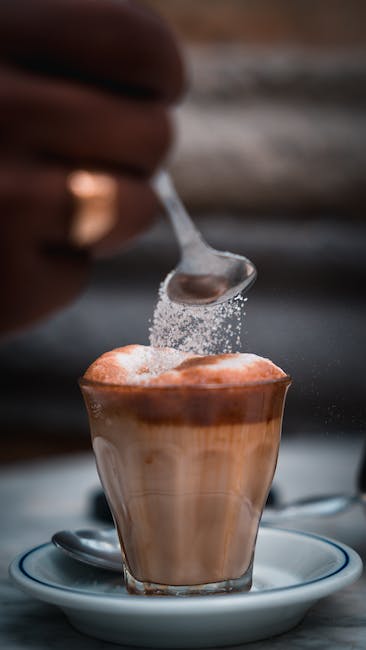Stevia vs Sucralose: The Sweet Debate on Healthier Sugar Alternatives
Are you trying to cut down on sugar but confused about which sweetener is the best alternative? With so many options on the market, it’s hard to know which to choose for your health and taste buds. In this comprehensive guide, we’ll dive into the sweet debate between stevia and sucralose, two popular sugar substitutes. By the end of this article, you’ll have a clearer understanding of which sweetener might be the right choice for you.
What Are Stevia and Sucralose?
Understanding Stevia
Stevia is a natural sweetener derived from the leaves of the Stevia rebaudiana plant. It has been used for centuries in South America to sweeten beverages and make herbal teas. Stevia is known for being a zero-calorie sweetener that is much sweeter than sugar, which means you need less of it to achieve the same level of sweetness.
Understanding Sucralose
On the other hand, sucralose is an artificial sweetener that is made by modifying sucrose, also known as table sugar. The result is a calorie-free sweetener that is about 600 times sweeter than sugar. Sucralose is widely used in a variety of food products and is also available as a tabletop sweetener.
Health Impacts of Stevia and Sucralose
The Benefits and Concerns of Stevia
Pros of Stevia
- Zero Calories: Stevia contains no calories, making it a popular choice for weight management.
- Blood Sugar Management: It does not spike blood sugar levels, which is beneficial for people with diabetes.
- Natural Origin: As a plant-based sweetener, stevia is often preferred by those seeking natural products.
Cons of Stevia
- Aftertaste: Some people may notice a bitter aftertaste when using stevia.
- Limited Research: While considered safe, long-term effects of stevia are not as extensively studied as other sweeteners.
The Benefits and Concerns of Sucralose
Pros of Sucralose
- Heat Stability: Sucralose is stable at high temperatures, making it suitable for cooking and baking.
- No Aftertaste: Many users report no aftertaste with sucralose, which can make it more palatable than other sweeteners.
Cons of Sucralose
- Artificial Nature: Being a synthetic product, some consumers are wary of potential health risks.
- Digestive Issues: Some studies suggest that sucralose may affect gut health and cause digestive discomfort for some individuals.
Comparing Taste and Usability in Food
How Stevia and Sucralose Affect Flavor
Stevia and sucralose both aim to mimic the sweetness of sugar without the calories. However, their taste profiles differ. Stevia’s natural origins can contribute to a slight herbal aftertaste, which some find undesirable. Sucralose, while generally considered to have a taste closer to sugar, can sometimes impart a different mouthfeel or subtle aftertaste.
Cooking and Baking with Stevia and Sucralose
When it comes to cooking and baking, both sweeteners have their pros and cons. Stevia’s heat stability varies depending on the product form, while sucralose is consistently heat stable and often preferred for recipes that require high temperatures. However, because both sweeteners are much sweeter than sugar, recipe adjustments are necessary to achieve the desired outcome.
Environmental and Ethical Considerations
The Production Impact of Stevia
Stevia’s production is generally considered to have a lower environmental impact than traditional sugar cultivation. The plant requires less land and water to grow, and because it’s much sweeter than sugar, less is needed to achieve the same sweetness level.
The Production Impact of Sucralose
Sucralose production involves a series of chemical processes, which raises concerns about environmental pollution and sustainability. Additionally, because it is not a natural product, some consumers have ethical reservations about consuming synthetic additives.
Commonly Asked Questions
Is Stevia or Sucralose Better for Weight Loss?
Both stevia and sucralose are calorie-free, so they can be useful tools for weight management. However, individual responses to sweeteners can vary, and it’s essential to consider overall dietary habits when trying to lose weight.
Can Stevia or Sucralose Affect Blood Sugar Levels?
Stevia does not affect blood sugar levels, making it a safe choice for diabetics. Sucralose also has minimal impact on blood sugar, but some studies suggest it may have other metabolic effects.
Are There Any Allergic Reactions to Stevia or Sucralose?
Allergic reactions to both stevia and sucralose are rare. However, individuals with sensitivities to sugar alcohols or other artificial sweeteners should use caution.
Conclusion: Making the Sweet Choice
When it comes to choosing between stevia and sucralose, there is no one-size-fits-all answer. Both sweeteners offer benefits and drawbacks, and the best choice depends on individual health goals, dietary preferences, and taste sensitivity. By considering the information provided in this article, you can make an informed decision that aligns with your lifestyle and wellness objectives. Remember, moderation is key with any sweetener, and maintaining a balanced diet is crucial for overall health.


